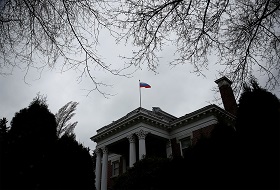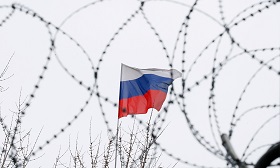As relations between Russia and the West deteriorate against the backdrop of the expulsion of Russian diplomats, more and more questions arise: Have crises like thus happened before? How can Russia avoid becoming the “greatest threat” in a universal sense? And how can we emerge from this difficult period in the relations between Russia and the West? Alexander Panov, RIAC member and Head of the Diplomacy Department at MGIMO talks about current problems and prospects for their resolution.
As relations between Russia and the West deteriorate against the backdrop of the expulsion of Russian diplomats, more and more questions arise: Have crises like thus happened before? How can Russia avoid becoming the “greatest threat” in a universal sense? And how can we emerge from this difficult period in the relations between Russia and the West? Alexander Panov, RIAC member and Head of the Diplomacy Department at MGIMO talks about current problems and prospects for their resolution.
A diplomatic crisis with attempts to isolate a country: has anything like this ever happened before and what was the outcome?
The word “isolation” is not quite proper here. There has never been a case of complete isolation. If Soviet Russia was isolated during the first years of its existence, it was a cordon sanitaire. Nevertheless, even Soviet Russia had diplomatic relations, starting in 1919 and expanding in 1920. The country developed relations with Iran, Turkey, Afghanistan and Mongolia, and later with China and Japan. A number of countries then recognized the Soviet Union as a sovereign state. So there was no isolation even at the time. There was a policy in “certain circles” intended to contain and constrain both relations and Russia.
Speaking of isolation in general, North Korea is the subject of the harshest sanctions policy today. However, it is not completely isolated and has maintained contacts with its neighbours and beyond. Complete isolation in international relations is not possible; there still will be certain opportunities to develop ties.
Could today’s situation be compared to the system of international relations that was present in the 19th century?
Certainly not. The Congress of Vienna took place in the 19th century and the Vienna System of international relations was established then. This was preceded by the Westphalian system of international relations. In the 20th century, the Versailles system appeared and was later succeeded by the Yalta–Potsdam system. They are all post-war systems; a group of states emerges victorious and then sets about building a specific system of relations. Some systems, such as the Vienna system and the Yalta-Potsdam system, existed for 40-plus years. The Versailles system reigned for 20 years. These systems are based on re-distributing power in international relations.
The same thing happened following the Cold War. It may have been “cold,” but it was still war. The war is over now, but the re-distribution of powers never happened, since the United States decided that it was the sole victor. Who do you negotiate with in such a situation? Russia also said it was a member of the Western community and, for all intents and purposes, supported everything the United States did. However, this system proved to be the most short-lived of all; it is probably not a system at all, but a unipolar world. China is ascending rapidly and powerfully. Russia and its influence on international affairs are also resurging. So, we are, de facto, talking a multi-polar world. This multi-polarity has not been formalized in any way. Various disparate structures are being created, and they are often not based on multilateral agreements. International law should be the glue holding all these structures together.
Today, we talk about the need to bolster international law, but this is a rather complicated task, since I believe the law has been significantly degraded. Such principles as the inviolability of borders, non-interference in internal affairs, using force only with the sanction of the UN Security Council, have all gone out the window. The basic principles are no longer valid. No matter how often we call for these norms and principles to be observed, they are constantly breached. Even the Vienna Convention on Diplomatic Relations has been repeatedly breached by the United States with regard to the diplomatic missions of the Russian Federation. Therefore, establishing a new system is not yet on the table, and this is why I think that today’s international relations are extremely unstable. Some academics believe we are witnessing a situation of anarchy, something we have not seen in a long time, certainly not in the 19th or the 20th centuries.
According to many Russian experts, and an increasing number of Western observers, one way out of the current crisis in relations between Russia and the West is the “small steps” approach – searching for issues where constructive collaboration is possible. What do you think about these ideas?
These are trifles; they do not matter. Small steps have always been there, as it is a survival policy. Such an approach can play its part, but it will not be particularly fruitful. If we are talking about global problems, such as preventing major conflicts like the wars in Syria and Ukraine, then small steps will not cut it. Small steps can be used to freeze conflicts and problems, but I am a proponent of searching for solutions. Even if this involves certain concessions on Russia’s part, we will make up these arrears in other areas.
Small steps can be both good and bad. Now, the American side is complicating the matter of issuing visas to Aeroflot crews. Is this a small step? Yes, it is, but it makes up a big and very unpleasant picture. If the Americans take the positive step of issuing visas at some point, one will really notice. This is why I don’t believe small steps can rectify the situation.
Ambassador Antonov finds himself in a difficult situation; there are reports that many U.S. politicians refuse to meet with him. How is he to perform his duties under such circumstances? How does this affect the embassy in terms of its ability to carry out its functions? Perhaps you could offer some recommendations?
This has happened before. Of course, we cannot say that the embassy is completely isolated. It is my understanding that there are regular contacts with the Department of State and with certain politicians: maybe not with Congresspersons, but with political scientists. Russian academics visiting the United States to take part in international conferences note that talks with politicians develop along fairly constructive lines. However, the United States has a major problem: its school of Soviet studies has virtually disappeared. At some point, the authorities decided they did not need specialists in Russian studies, because Russia is in ruins. Now the United States in reaping the fruits of its policy: there are hardly any American specialists in Russian studies. They have been replaced with members of the Russian opposition. They listen to their opinions, run analyses based on their statements, which utterly distorts the real picture. Of course, even in Soviet times, meetings with the younger generations held at the Embassy were very effective. These meetings have always attracted great attention. Maybe we should take that path again. In any case, we cannot count on the sentiments of the U.S. elite changing anytime soon.
What do you think about the new trend of stepping up digital diplomacy? Some Russian embassies are very active on the internet. To what degree does it help to solve the tasks they face?
Of course, this work is very important. We don’t have a choice – it has to be done. But there are nuances here as well. Certainly, diplomats on the ground know the sentiments in their host country. But not all of them are masters of propaganda (in the positive sense of the word) and the art of presentation. Unfortunately, it is hard to staff embassies, particularly small ones, with relevant professionals. Engaging in digital diplomacy also requires special training. This is why comprehensive work is required: diplomats and embassies need aid both centrally and locally in compiling and presenting their statements.
Is there a universal formula that Russia should follow in order to maintain its influence and authority and at the same time avoid isolation and not become a “principal threat” in the universal sense?
I do not like saying that somebody perceives Russia as a universal threat. The West and the United States stand for one type of politics. But it does not mean the entire world believes this is the right and proper policy regarding Russia. We have excellent relations with China, India and ASEAN countries; Russia even has advanced relations with Japan. A universal formula is thus impossible. Clearly, the U.S. policy is there to stay at least as long as Donald Trump is the President. In Europe, anti-Russian sentiments will persist for quite a while. Yet even under such circumstances, we need to maintain and bolster relations with those countries that are interested in developing ties with Russia.
Unfortunately, in its relations with some states, Russia has succeeded in digging up some problems and hammering them in. This is an entirely unproductive development route. At some point, one needs to compromise, to make some concessions while keeping the strategic goal of buttressing the country’s international stance in sight. This policy should certainly be geared toward searching for solutions to pressing problems, such as the conflicts with Georgia, Moldova and several Central Asian countries. That is, we need to search for a constructive way out of difficult situations.
The key for Russia today is to build its strength and resources. To some extent, we need to repeat what Alexander Gorchakov did – focus on the domestic problems. For instance, developing breakthrough technologies may inspire other countries to resume or develop friendly ties with Russia and see our country as a serious player in these areas. The Cold War is often referenced in this connection. When Sputnik was launched and the first manned space flight took place, there was a global burst of positive attitude towards the USSR, and the situation changed radically. Even though the Prague intervention and other events followed, the world was saturated with pro-Soviet sentiments at the time. If we could do something similar today, it would do Russia the world of good.







